Pigs make for entertaining and rewarding company, thanks to their affectionate nature. There’s even a rising trend of owning ‘mini’ pigs, as popularized by many celebrities.
Pigs can be good pets, though they tend to destroy things due to their nature as foragers. Pigs may be subject to pet licensing and outdoor zoning laws. Pet pigs also need sufficient space, appropriate food, and clean water.
Beyond its cute looks, keeping pigs as pets can be a challenge. Before buying one, you should be informed about what it takes to have one in your home. Pet pigs can take up time and cost, from their food to maintaining their outdoor space. Without further ado, take a look below at whether pigs are a good choice of pet for you.
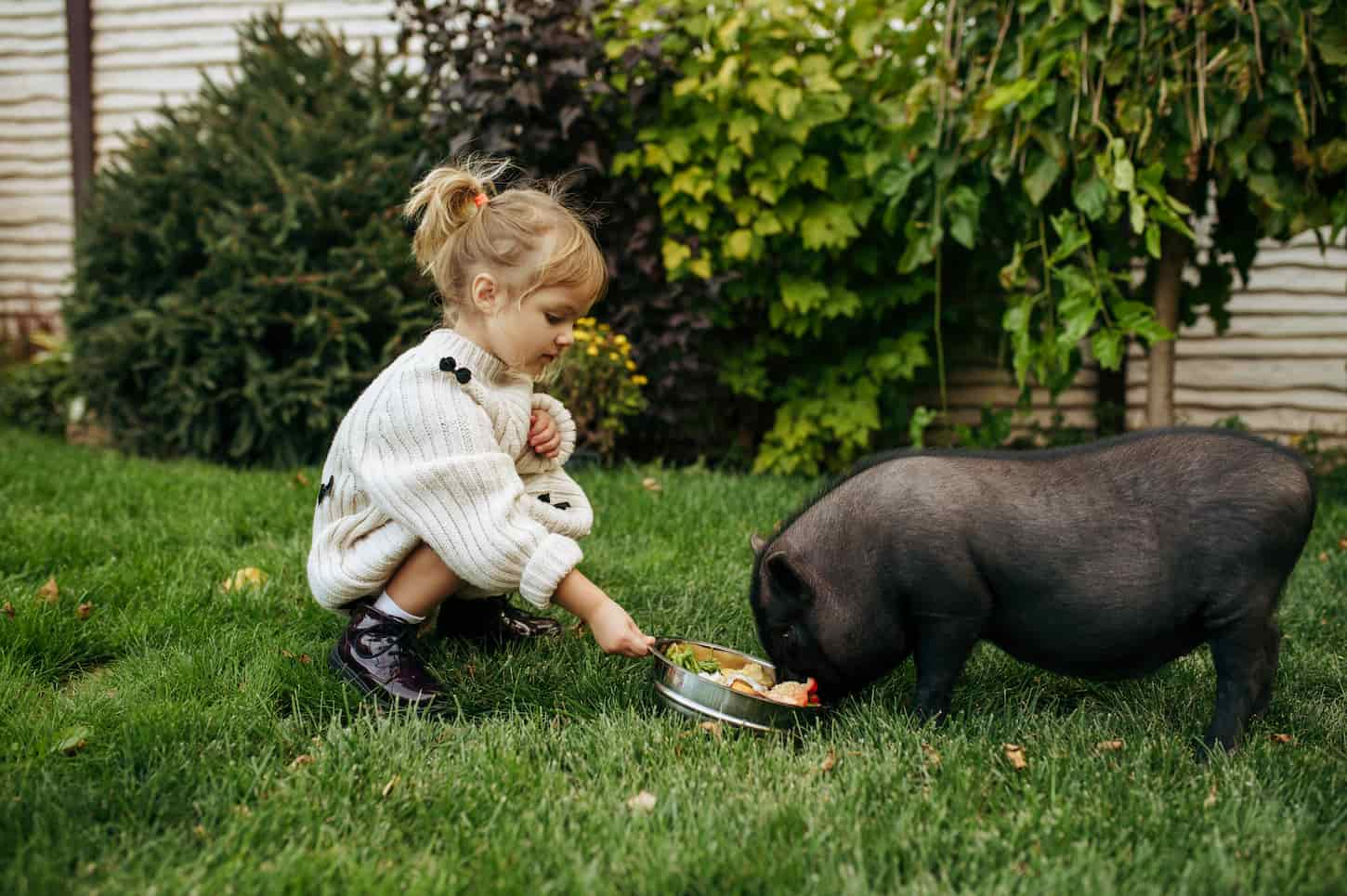
Pigs as Pets
Have you always wondered what it would be like to own a pig as a pet? While they might take some time to get used to, the efforts can be worthwhile.
Can you have a pig as a house pet?
Pigs can be kept as house pets, though they can quickly grow larger than planned.
Although pigs were bred as livestock rather than pets, they can certainly be house pets. Just remember that because they were bred as livestock, they could quickly grow, and can weigh 100-plus pounds quite easily.
If that seems to be more than you can handle, it’s probably best to not get one. Keep in mind that pigs you intend to keep as pets should be bought from reputable pig breeders.
If you’re planning on letting your pet pig be outside, be aware of your local pet rules and zoning ordinances, too. Those may affect how or where your pet pig can live.
Here in our corner of Utah, for example, we can have two indoor, licensed pets of our choice (within reason). However, if we chose to add a pet pig to the backyard as part of our homestead livestock, we’d have to look at our zoning laws. And we’d need at least an acre per pig, which means no outdoor pigs for us on our half-acre.
Is having a pet pig a good idea?
Pigs enjoy foraging, chewing, and rooting, which means they can be destructive. If you have a well-manicured garden, owning pigs might not be the best idea. The same also applies if you keep them indoors – you wouldn’t want to come home to broken belongings one day!
Additionally, if you suffer from allergies, pigs could be a great pet alternative to dogs and cats. This is because pigs have bristly, hypoallergenic hair that hardly sheds.
Just keep in mind that pigs are typically more destructive than most cats or dogs will ever be.
Do pigs make good house pets?
Pigs make good house pets for some, though many people find them too loud, smart, or territorial to be kept as indoor pets.
Pigs are social, smart, and inquisitive – all the traits you could ever want in a pet. However, they can get quite loud at times. Be aware that they can grunt and squeal when they’re excited, which is usually when they’re about to be fed.
However, pigs are also known as territorial animals. This means they have the capability to claim your house as their own. With strict discipline and giving them time outside, you can avoid this. Pigs will automatically take on the leader role and can become aggressive toward people, so make sure you’re showing authority as the alpha and owner of the home.
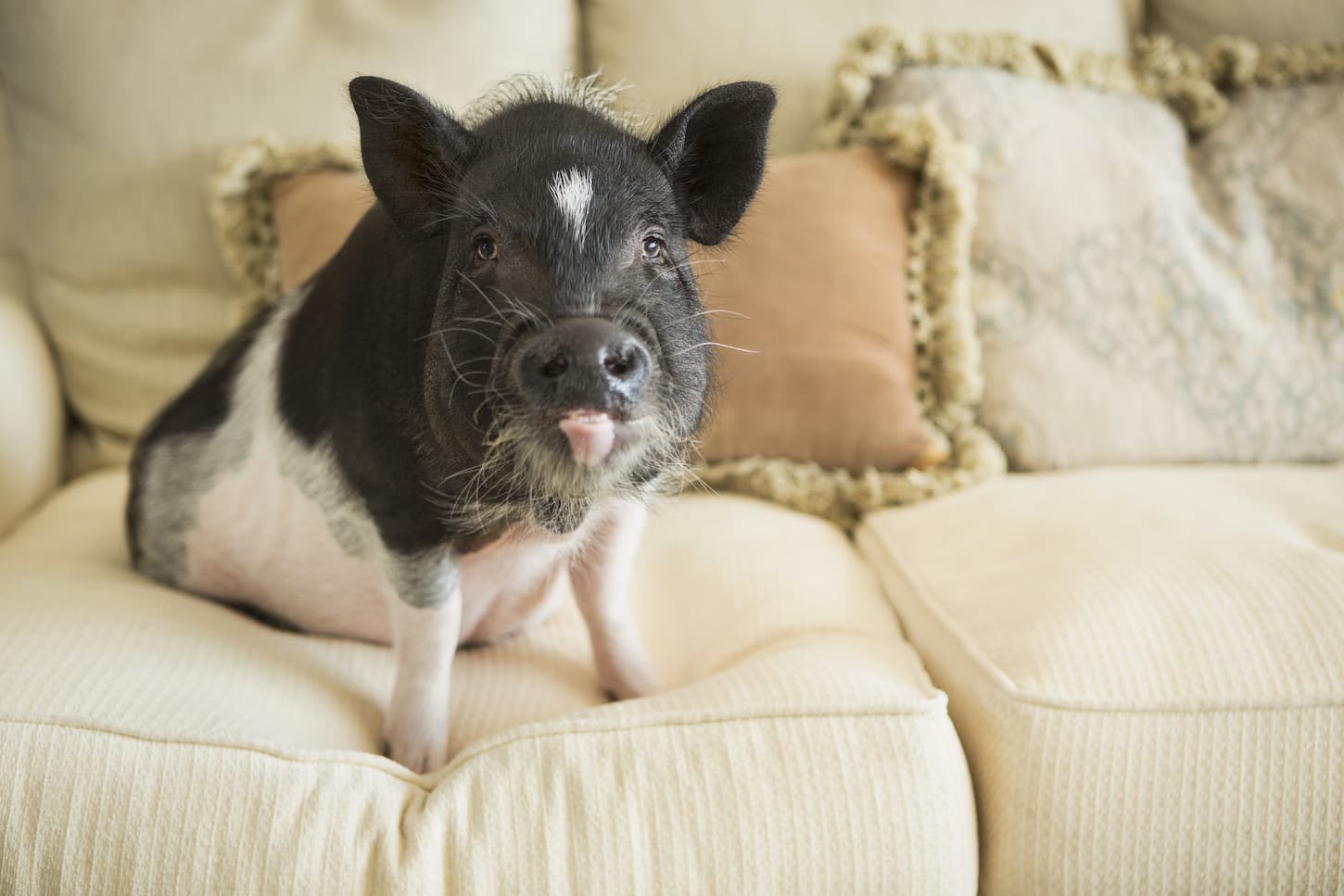
How long do pigs live as house pets?
House pet pigs can live up to 20 years, though most micro and mini pigs only live 4-5 years.
Pigs can live as house pets as long as you allow them to. The life expectancy of pigs is around 10 years or more. With the right care, they can sometimes reach 20 years of age.
Unfortunately, ‘micro’ pigs only live for around five years, as they are more prone to health problems due to their small size and lack of proper nutrition (source).
Part of keeping a miniature pig small (so it doesn’t grow to regular size) is limiting its food. This can be an issue, and we’ll talk more about this later in the article. But just to drive home the point, always make sure you’re consulting a veterinarian about your pig’s diet, no matter their size.
Caring for Pigs
For those that have zero experience in owning a pig, they can seem to be quite high maintenance. But once you get familiar with their habits and needs, it will be just as easy as taking care of a traditional house pet.
Are pigs high-maintenance pets?
Pet pigs require a lot of attention to detail, meaning they are a higher maintenance pet than most traditional indoor pets. Pigs require fewer vet check-ups than cats and dogs, but vet visits are costlier than for cats and dogs.
Studies have shown that pigs have the intelligence level of a three-year-old child, which means they require mental stimulation, attention, and company. Without anything to keep them entertained, they will likely become bored and destructive.
Because of this, it’s preferred to not leave them home alone during the day. Alternatively, consider getting a pair of pigs so they’ll always have company even when you’re not home. But then you have two pigs to prepare for, so keep that in mind.
Pigs can get sunburnt easily, so it’s vital that you provide them shade when they’re outdoors. They also can’t sweat, which means they’re prone to overheating. To help with this, they like to take dirt or mud baths in order to cool off. Although simple in theory, it may require you to clean up after them if you want them inside the house.
In terms of veterinary care, pigs may only need to visit the vet once a year for vaccinations and hoof trimming. They may have to see the vet less often than dogs or cats, as they’re generally healthy animals. However, the vet bills tend to be more costly as most vets don’t see pigs, so you’ll likely have to find a specialist veterinarian.
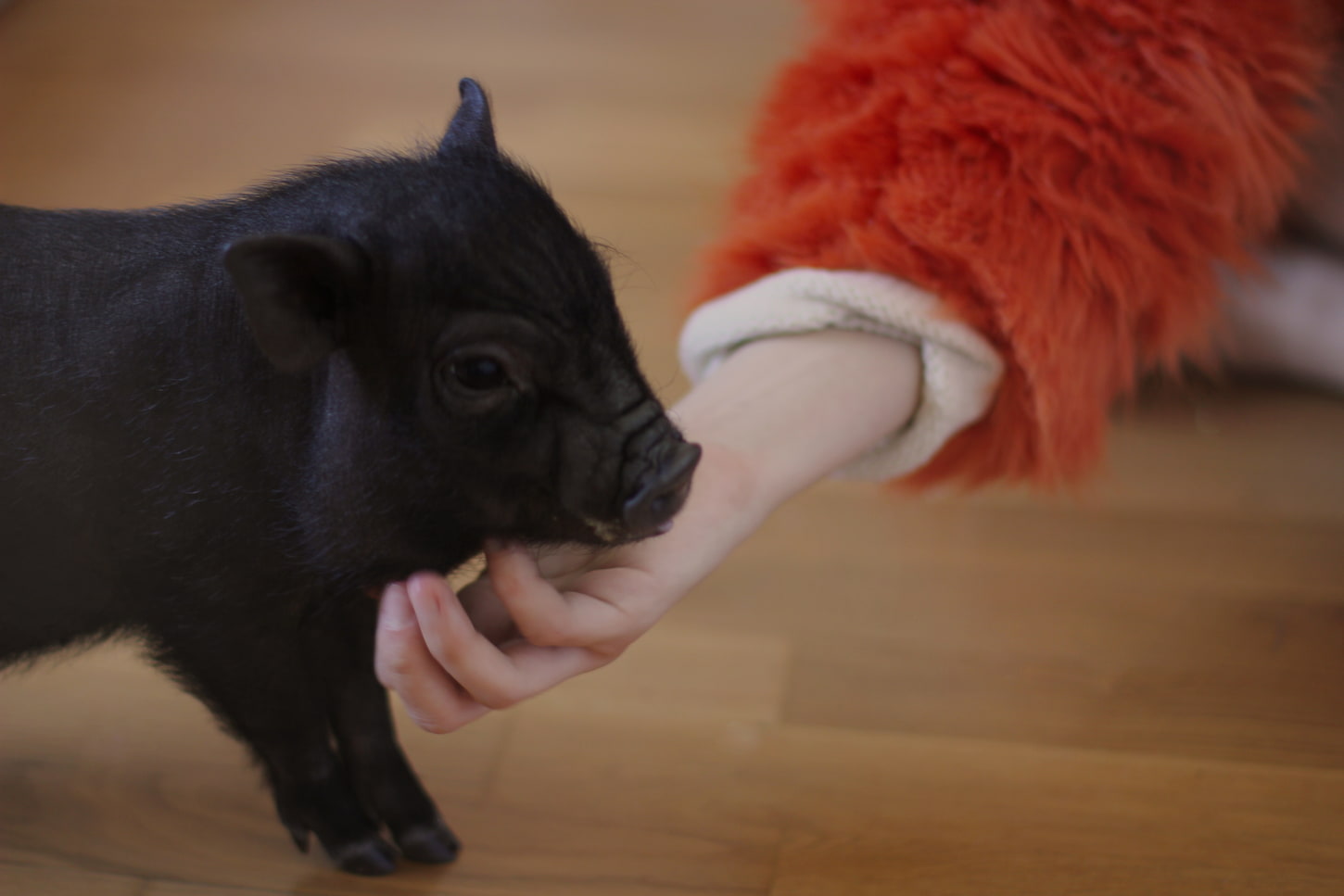
Are pigs easy to care for?
Pigs can be easy to care for, once the routine and systems are in place. Setting up those systems and routines will vary from person to person.
Pigs can be trained the same way as dogs, including being toilet trained. When they’ve been trained to use litter boxes or to wear leashes or harnesses, they can be easily cared for. All you’ll need to do is feed them at the right time, as pigs appreciate routine.
And you’ll really want to stick to the feeding schedule, or your pigs may go exploring and foraging on their own. Of course, they may go foraging on their own anyway.
As pigs are known as foragers, they can go so far as to overturn bins and containers. Given their intelligence, they are also known to open fridges and cupboards to reach for food. They love food and they are smart enough to know what they like.
If they’re not being fed enough or they like too much of a certain food, they have the potential to show dangerous behavior (source).
In addition to knowing what to feed them, there are strict regulations you must follow as a pig owner. For instance, there may be laws concerning their diet, as well as the identification and movement of your pigs.
This means that you may need a walking license to exercise your pig. You would also have to let authorities know if you’re moving your pig away from your place of residence (source).
Once you know the rules, they will be easier to care for. So make sure you know about your local pet, licensing, and zoning laws before you bring home a pet pig.
How to care for a pet pig
Pet pigs require regular care, sufficient space, clean water, regular veterinarian care, and a healthy diet.
Pig Care Tip #1: Pigs need proper food
Pigs will eat almost anything – from cereals to fruit and vegetables, and even insects. They can also be fed beans, peas, and lupins as a source of protein. Ensure that they can also root for their food as they would naturally.
Be aware that there are things you shouldn’t feed your pigs depending on where you live.
- For instance, pigs shouldn’t be fed food that contains any meat. In fact, it’s illegal to do so in Australia, as it keeps the diseases at bay (source).
- In the UK, it’s illegal to feed scraps to them and they must be fed a specialized feed (source).
Pig feed is probably the safest thing to use in most cases.
Pig Care Tip #2: Pigs need space
Space is one of the biggest needs for pigs. Regardless of whether you keep your pigs inside or outside the house, they should be given their own space.
Consider designating a room just for them in the house, or you could build a makeshift wooden home outside in the backyard.
Without enough space, they can become easily depressed and anxious, which can turn into serious behavioral problems.
It’s probably not a great idea to own pigs if you live in an apartment, even if you take them on long walks (source).
Pig Care Tip #3: Pigs need shelter
Pigs are happy to stay either inside or outside the house. If they stay indoors, they should have space outside to exercise and keep their instinct to forage intact.
Pigs like to nest, so give them something to hide themselves in. For indoor pigs, give them a pile of blankets to sleep in. For outdoor pigs, you can offer them straw or sawdust that they can dig around in.
Pig Care Tip #4: Pigs need proper health care
It’s important to desex both male and female pigs.
According to some sources, un-desexed (or intact) males will become “aggressive, restless, and smelly” or worse. Meanwhile, un-desexed (or intact) females will get “restless, vocal, and moody” (source).
Females can also be in heat every three weeks, which can be problematic for owners. It’s worthwhile to know if there’s a veterinarian within your area, like ones that can treat pigs that might be further away.
A veterinarian is handy to have nearby, as pigs should be checked for worms and have their hooves trimmed annually.
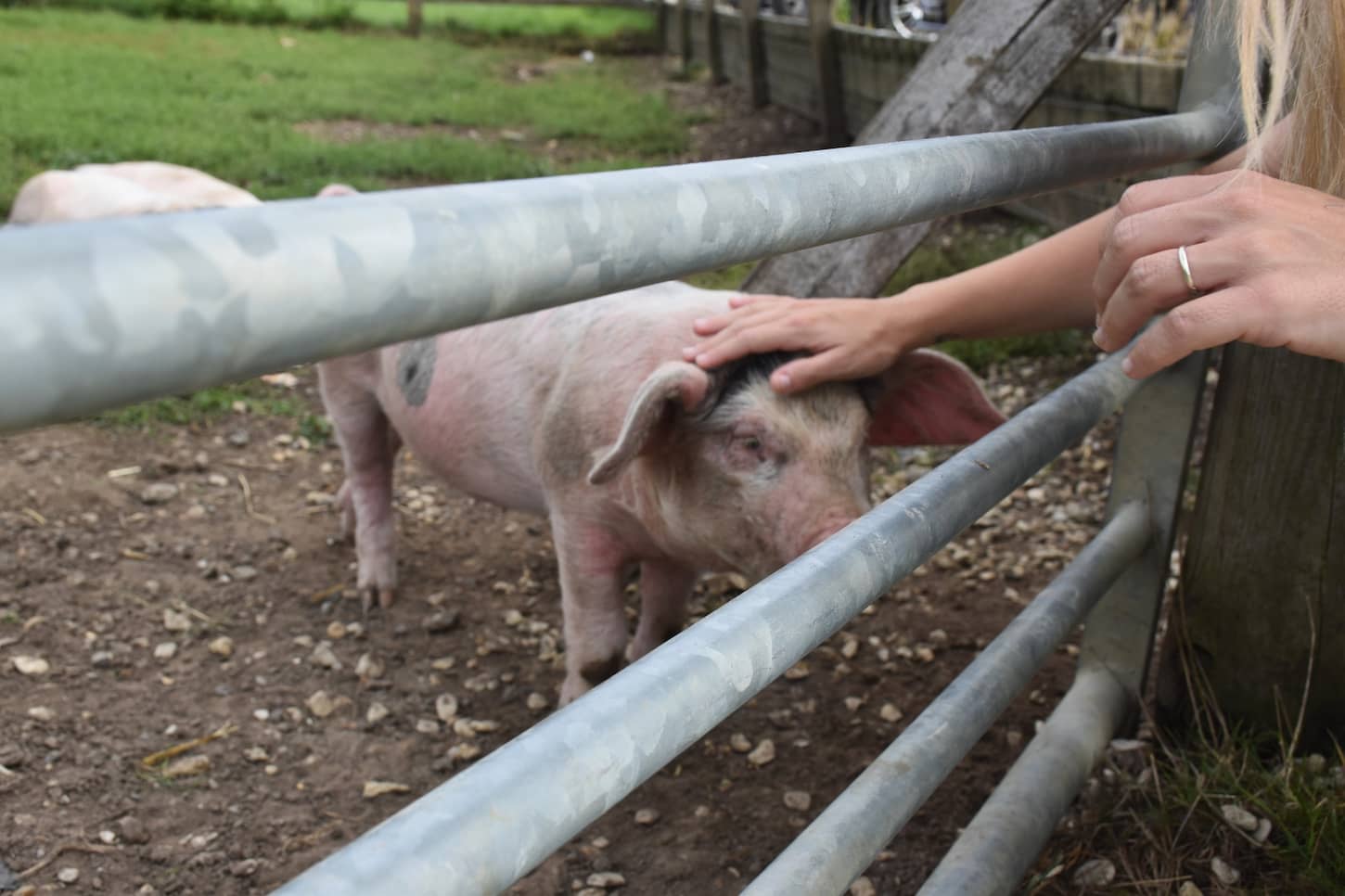
Behavior of Pigs
You might think that all they do is forage for food, but there is so much more to pigs that might surprise you.
Do pigs like to be petted?
Pigs love getting attention from their owners! In fact, this kind of affection is encouraged for pet pigs. Pigs particularly enjoy rubs on their bellies, as well as scratches.
Do pigs like to cuddle?
Despite being originally bred as livestock instead of house pets, pigs are nothing less than great companions. They’re great as cuddling companions, as they crave body heat due to their pack or herd animal instincts.
Are pigs friendly?
Pigs are generally friendly, but they have the potential to become territorial. As they’re pack animals, they’re used to recognizing a leader. If there isn’t one, they will step into the role and become aggressively territorial.
When they become territorial, they can become aggressive with humans. If you decide to own a young pig, make sure to pay attention to them closely and discourage territorial behavior.
What is the friendliest breed of the pig?
Pot-bellied pigs and kune kune pigs are the friendliest breeds of pigs.
Their territorial instincts aside, most pig breeds are friendly. However, the pot-bellied pig and kune-kune pig are the most popular breeds to own as a pet.
Pot-bellied pigs are active, curious, and affectionate, while kune-kune pigs are super friendly and have an overall just-dang-adorable quality.
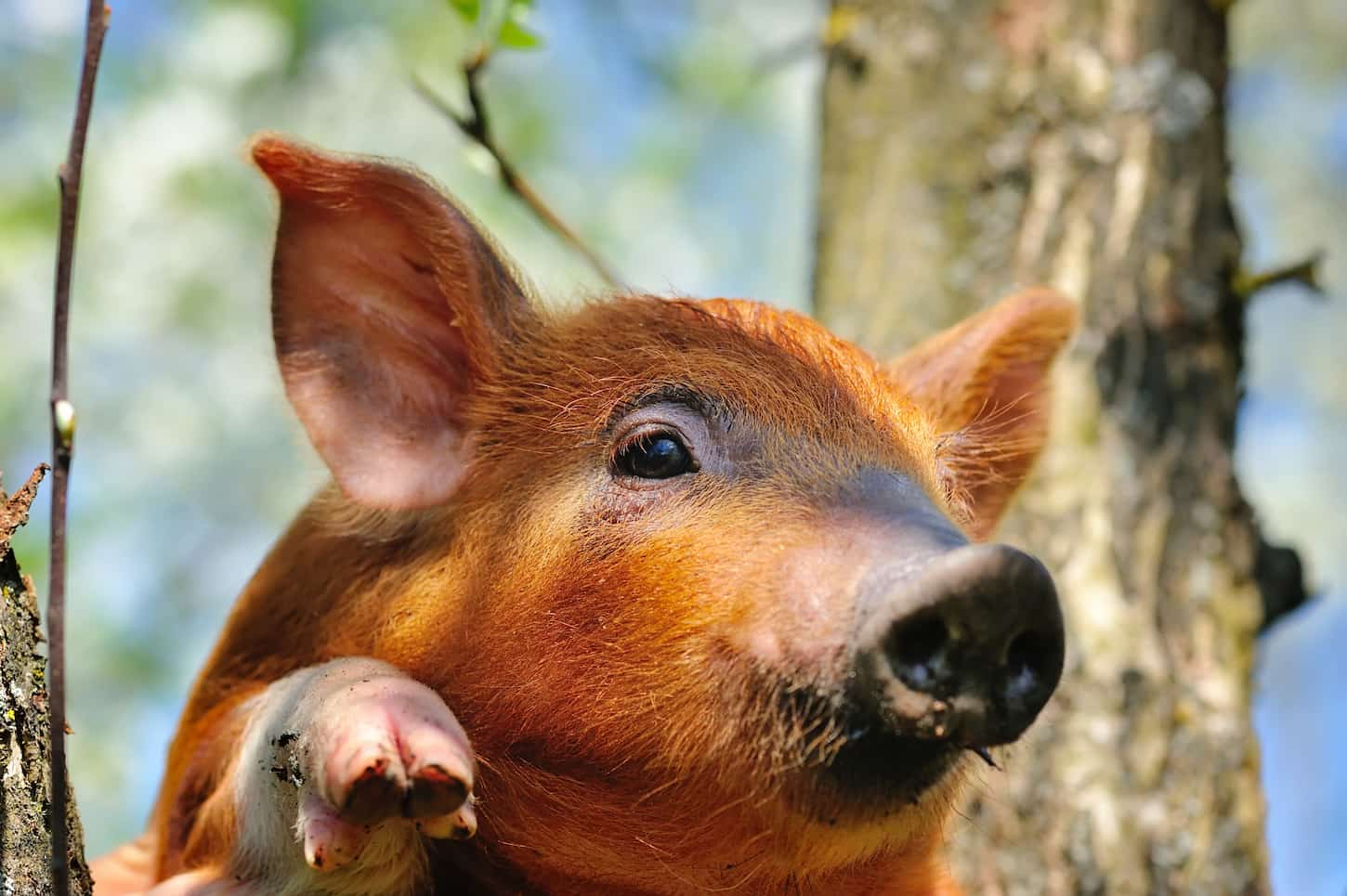
What kinds of pigs make good pets?
Potbelly, Vietnamese potbelly, and royal dandies are breeds of pigs that make good pets.
If you can’t stop dreaming about owning a miniature pig, they certainly make a good pet. Their tiny size is convenient, as it won’t require as much space.
A miniature adult pig can weigh between 110 to 200 pounds. Meanwhile, commercial breeds of pigs can go up to 550 to 660 pounds. If you don’t have the room or experience in dealing with the latter, consider going for a miniature breed.
While there is no such breed as a “mini” or “micro” pig, there are breeds that are smaller than the average pig. The most popular of the ‘micro’ pigs are a variety of pot-bellied pigs, Vietnamese potbellied, and royal dandies.
Keep in mind that even the “mini” or “micro” pigs aren’t a separate breed – they’re just smaller versions of the regular-sized animal. As such, these animals can quickly become regular-sized (or even oversized) if overfed.
In other words, your cute little pig can quickly become a big pig if it’s fed too much. The best way to keep it small is to carefully regulate its nutritional intake.
Just keep in mind that doing so without a veterinarian’s guidance can quickly lead to a malnourished animal, which isn’t awesome. So be sure to consult your veterinarian about your pig’s diet.
Do pet pigs love their owners?
When treated well, pet pigs will love their owners just like any other pets.
They’re affectionate and enjoy snuggling up to them. Pigs squeal when happy and can also bark if there’s danger around.
Do pigs get along with other animals?
If you have other animals, you might want to include them in your decision to get a pet pig.
Because pigs are naturally prey species, dogs and cats might not be a good fit, as they are natural predators. Similar to cats and dogs, pigs can get aggressive and injure other animals.
To make your new pig build a relationship with your other pets, might take some time and close monitoring.
Which is a better pet: a pig or dog?
Whether a pig or a dog is a better pet ultimately comes down to your choice. Both are intelligent animals; however, dogs are more conventional and can be considered easier to take care of.
The last thing to consider is costs, as pigs are more of an expensive pet. Pigs would have to visit a vet more frequently than dogs and the visits will be pricier. Vet costs could be up to several thousand dollars a year.
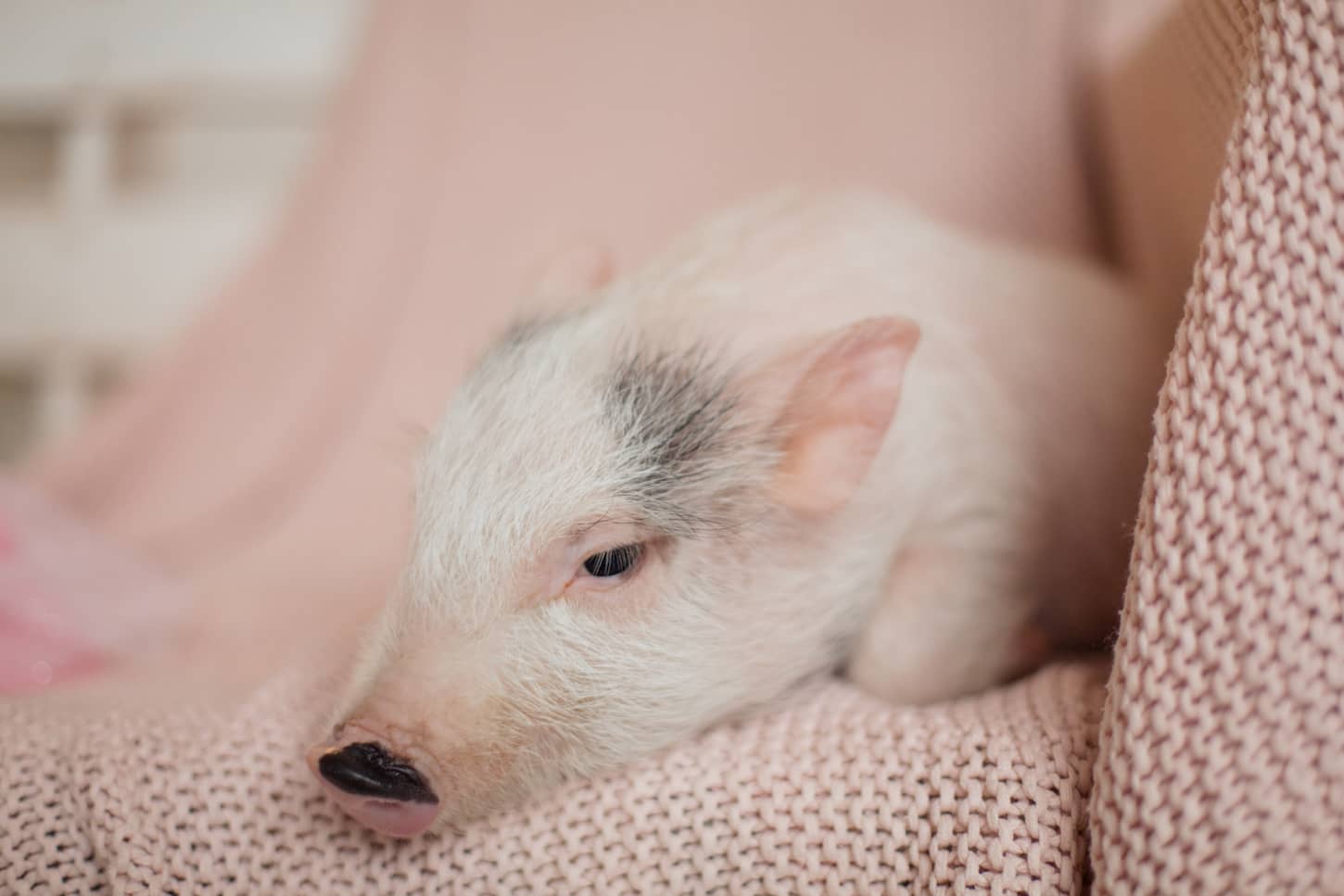
Final Thoughts
Taking in rescue pigs can be extremely rewarding. They make good house pets, given that you have the space and resources. But like adopting almost any other animal, it’s important that you know exactly what to expect. Some owners are able to own a pig, but there have been instances where they have to give it up because it doesn’t suit their lifestyle.
There is significant time and financial commitment when it comes to having a pet pig. They can be expensive: from food costs to vet bills to maintaining a suitable outdoor space. Remember to take everything into consideration before making a decision (including damage caused by potentially mischievous pigs!). Always keep in mind that the well-being of cute pigs could be compromised if you haven’t considered all the pros and cons!
Need help figuring out if your homestead will do well with adding some pigs? Make sure you check out my article where I show you exactly which animals are compatible with which. Go give it a read next, and good luck planning your ever-improving backyard homestead.
Resources
Learning from your own experience is essential, but learning from others is also intelligent. These are the sources used in this article and our research to be more informed as homesteaders.
- “Pigs as pets.” Good Heart Animal Sanctuaries, https://www.goodheartanimalsanctuaries.com/animals-welfare/pigs-as-pets/.
- The Open Sanctuary Project, Inc. “Creating A Good Home For Pigs.” The Open Sanctuary Project, 1 Sept. 2021, opensanctuary.org/article/building-a-good-home-for-pigs.
- “What To Know Before Adopting a House Pet Pig.” Tractor Supply, https://www.tractorsupply.com/tsc/cms/life-out-here/the-barn/pigs/what-you-should-know-about-pigs-as-pets/.
